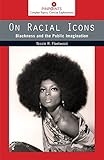On Racial Icons : Blackness and the Public Imagination / Nicole R. Fleetwood.
Material type: TextSeries: PinpointsPublisher: New Brunswick, NJ : Rutgers University Press, [2015]Copyright date: ©2015Description: 1 online resource (144 p.) : 33 photographsContent type:
TextSeries: PinpointsPublisher: New Brunswick, NJ : Rutgers University Press, [2015]Copyright date: ©2015Description: 1 online resource (144 p.) : 33 photographsContent type: - 9780813565156
- 9780813565132
- African American celebrities
- African Americans in mass media
- African Americans -- History
- African Americans -- Race identity
- African Americans -- Social conditions -- 1975-
- African Americans -- Social conditions -- 1975-
- Art and race
- Blacks -- Race identity -- United States
- Blacks -- Race identity
- Mass media -- Social aspects -- United States
- Photography -- Social aspects -- United States
- Visual communication -- United States
- SOCIAL SCIENCE / General
- Black Lives Matter, Trayvon Martin, Barack Obama, Diana Ross, Serena James, LeBron James, Emmet Till, Black Madonna, Janel Monea, Paul Robeson, Malcom X, Martin Luther King Jr, Michelle Obama, Sasha, Malia, Frederick Douglass, Harry Langdon, Motown, Black Panthers, Angela Davis, Lena Horne, Josephine Baker, Billie Holiday, Michael Jackson, Jackson 5, Bessie Smith, Bob Marley, Nelson Mandela:Michael Jordan
- 302.23089/96073 23
- P94.5.A37 F54 2015
- P94.5.A37 F54 2015eb
- online - DeGruyter
- Issued also in print.
| Item type | Current library | Call number | URL | Status | Notes | Barcode | |
|---|---|---|---|---|---|---|---|
 eBook
eBook
|
Biblioteca "Angelicum" Pont. Univ. S.Tommaso d'Aquino Nuvola online | online - DeGruyter (Browse shelf(Opens below)) | Online access | Not for loan (Accesso limitato) | Accesso per gli utenti autorizzati / Access for authorized users | (dgr)9780813565132 |
Frontmatter -- Contents -- Illustrations -- Acknowledgments -- Introduction -- Chapter 1. "I Am Trayvon Martin": The Boy Who Became an Icon -- Chapter 2. Democracy's Promise: The Black Political Leader as Icon -- Chapter 3. Giving Face: Diana Ross and the Black Celebrity as Icon -- Chapter 4. The Black Athlete: Racial Precarity and the American Sports Icon -- Coda -- Notes
restricted access online access with authorization star
http://purl.org/coar/access_right/c_16ec
What meaning does the American public attach to images of key black political, social, and cultural figures? Considering photography's role as a means of documenting historical progress, what is the representational currency of these images? How do racial icons "signify"? Nicole R. Fleetwood's answers to these questions will change the way you think about the next photograph that you see depicting a racial event, black celebrity, or public figure. In On Racial Icons, Fleetwood focuses a sustained look on photography in documenting black public life, exploring the ways in which iconic images function as celebrations of national and racial progress at times or as a gauge of collective racial wounds in moments of crisis. Offering an overview of photography's ability to capture shifting race relations, Fleetwood spotlights in each chapter a different set of iconic images in key sectors of public life. She considers flash points of racialized violence in photographs of Trayvon Martin and Emmett Till; the political, aesthetic, and cultural shifts marked by the rise of pop stars such as Diana Ross; and the power and precarity of such black sports icons as Serena Williams and LeBron James; and she does not miss Barack Obama and his family along the way. On Racial Icons is an eye-opener in every sense of the phrase. Images from the book. (http://rutgerspress.rutgers.edu/pages/Fleetwood.aspx)
Issued also in print.
Mode of access: Internet via World Wide Web.
In English.
Description based on online resource; title from PDF title page (publisher's Web site, viewed 30. Aug 2021)


